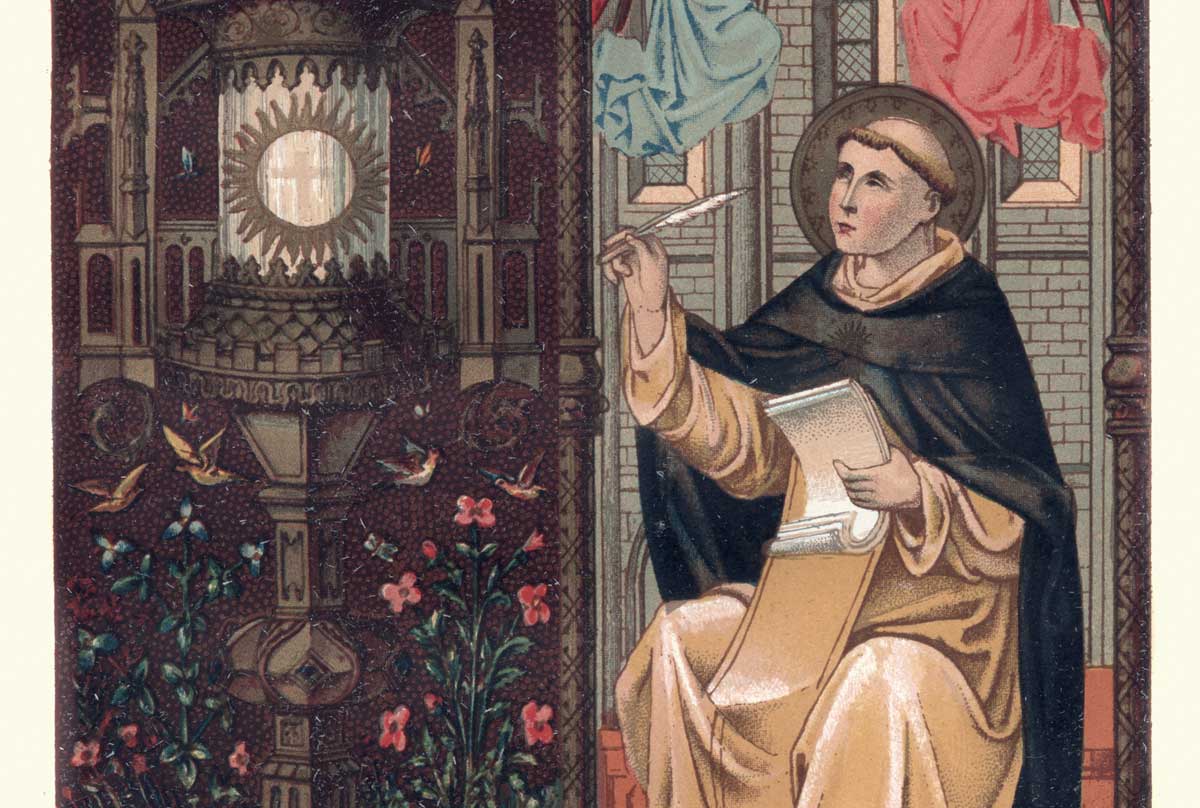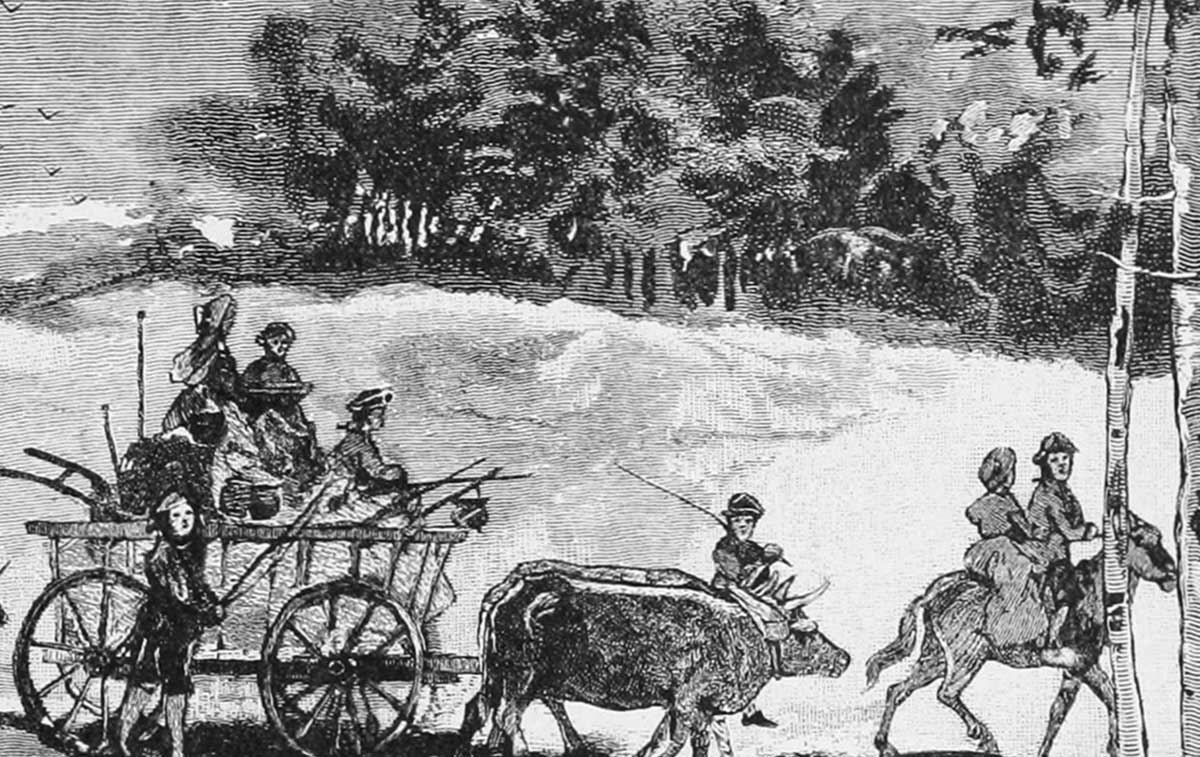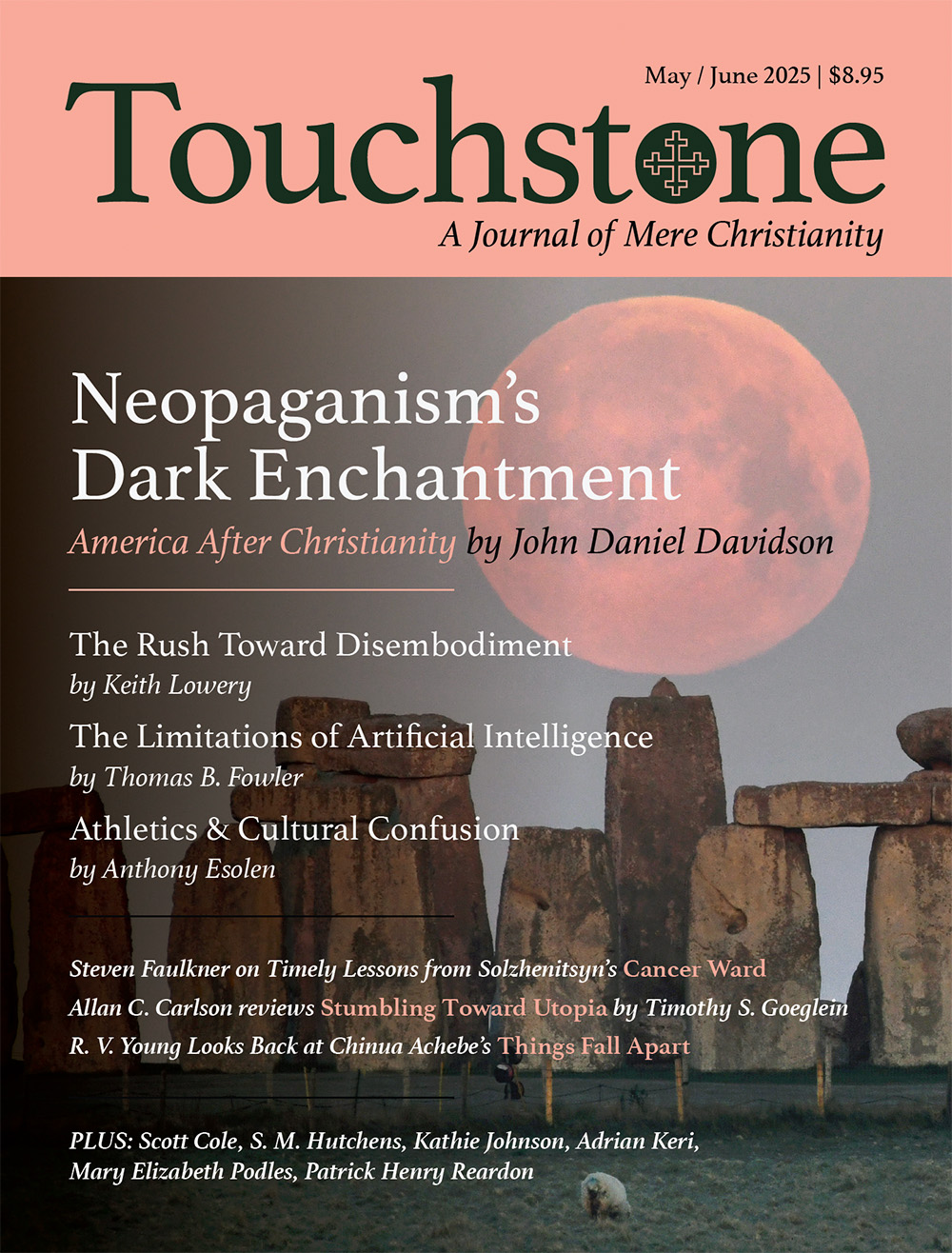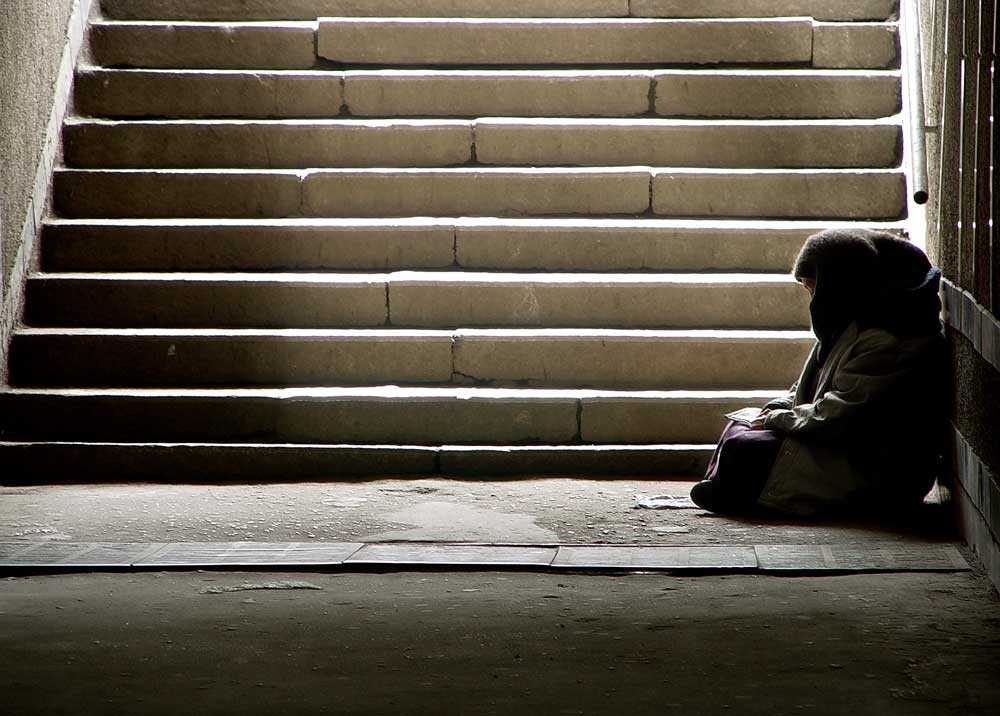America After Christianity
Neopaganism’s Dark Enchantment
Archbishop Fulton Sheen declared in a 1974 television address that “we are at the end of Christendom,” which he defined as “economic, political, [and] social life as inspired by Christian principles.” “That is ending,” he said; “we’ve seen it die.” A quarter-century later, Pope St. John Paul II said, “Even in countries evangelized many centuries ago, the reality of a ‘Christian society’ which, amid all the frailties which have always marked human life, measured itself explicitly on Gospel values, is now gone.”
However debatable Sheen’s assessment was fifty years ago, or John Paul’s was in 2001, it is undeniable today. Christendom is gone. Whether we realize it or not, the West has entered a new, post-Christian era.
What does that mean, exactly? To begin with, it means Christian morality will no longer shape our public life. It also means we will no longer desire or seek out Christians for positions of leadership in society. In fact, we will consider sincere Christians to be bigots and fascists, unfit for positions of public trust. This opinion has already been widely adopted by the mainstream left, and on certain subjects it is now being adopted by the mainstream right. In sum, the de-Christianization of America means that the mainstream culture in our country will not simply be secular or neutral toward Christians; it will be actively hostile towards the Christian faith.
If a de-Christianized America is hostile towards the Christian faith, it will also be hostile toward those ideals and principles that are derived from and dependent on that faith—things like freedom of speech and religion, government by consent, equality under the law, basic human rights. None of these things will be tolerated by a post-Christian cultural and political order. They will disappear along with Christendom. They are already disappearing right before our eyes.
Most people in the West today do not realize this or do not accept it. But it is happening all the same. Therefore, our task is, first, to accept that this sea-change is happening—indeed, that it has already happened—and second, to persuade others of the reality of our situation. Only then can we begin to think clearly about what is to be done about it.
Parallels with Fading Pagan Rome
There is a historical comparison that might help us wrap our minds around this. In The Final Pagan Generation, historian Edward Watts writes that Romans born in the first quarter of the fourth century AD were the last cohort of Roman pagans. These Romans were
born into a world in which most people believed that the pagan public religious order of the past few millennia would continue indefinitely. They were the last Romans to grow up in a world that simply could not imagine a Roman world dominated by a Christian majority.
When their world finally collapsed, they were old men who did not realize that for most of their lives they had been living in a social and religious order that was disappearing forever. The oldest members of this generation were born into an empire that had never had a Christian emperor and had actively suppressed Christianity and viciously persecuted Christians. They would die in an empire that would never again be ruled by a pagan emperor and would never again publicly support the pagan sacrifices, temples, and festivals of the old Roman order. They did not see Christendom coming, and when it came, they could not believe it would transform their world forever.
It behooves us to think of this generation now, not because our Christian faith is at risk of the same fate as Roman paganism, but because we are at risk of making the same mistakes the final pagan generation did: assuming that our society and civilization will long survive cut off from its source, which has always been the Christian faith, alive and active among the people. As Christianity fades from public life in the West, something else will take its place. Something else is already taking its place.
This new, post-Christian era in the West is best understood as a re-paganization—that is, paganism returning in a modern form. You might call it neopaganism for a technological and digital age.
Why paganism? Because once we reach the end of secular materialism, which we have indeed reached, some form of paganism, or at least of the pagan ethos, is the only alternative to Christianity.
Different Forms, Same Roots
And what do we mean by “pagan”? It can be a vague term, and perhaps misleading. The return of paganism does not mean we will see a return of its ancient forms—no temples to Zeus or Apollo will be erected in Times Square. It will take a contemporary form, one befitting our postmodern age of re-enchantment.
For example, consider the exploding popularity of “witchcraft influencers” on TikTok and Instagram. Older people might scoff at this, but they shouldn’t. The degree to which social media really does influence and shape our culture today cannot be overstated. Witchcraft is often presented, especially to young people, as a means of empowerment and identity. You might call it therapeutic witchcraft. If you look for it online, you will find it everywhere.
Or to take another example, consider our shifting rhetoric about abortion. At the time of Roe v. Wade, the justification for abortion was that the unborn child was “just a clump of cells,” and ending a pregnancy was no different from getting an appendectomy. Advances in medical technology in the 1980s and 1990s soon rendered that justification untenable. So then we were told that abortion was an unfortunate reality of the modern world, which, as long as we were going to allow it, should be “safe, legal, and rare.”
Today, we no longer bother with these polite fictions. About ten years ago, pro-abortion activists coined the phrase, “Shout your abortion.” Women were told that they should not be ashamed of killing their unborn child, that abortion was a positive good, that there should be no social stigma attached to it, and that, in fact, it was something to shout from the rooftops.
Given the state of medical technology today, there can be no reasonable debate about the humanity of the unborn. They are human beings; they are alive; they can feel pain; they can even express preferences for certain kinds of foods. No one today pretends that unborn children are merely “clumps of cells.” And yet our cultural consensus is that they can be killed with impunity. Having fought a civil war to eradicate slavery, we have come around at last to embracing a new form of it. We believe that, in order to vindicate the rights of women, an entire class of people must be denied all rights, including the most basic right to life. Put bluntly, abortion today is not just a new form of slavery; it is also a new form of human sacrifice, which has always been a feature of pagan societies.
At its most basic, paganism means “not Christian” or even “anti-Christian.” Indeed, the pagan worldview is an almost perfect inversion of the Christian one. Instead of a transcendent, almighty God ruling over all his creation, the pagan mind posits a multitude of immanent gods populating our world in the here and now. Instead of objective morality based on the givenness of creation and a fixed moral order, the pagan ethos demands moral relativism appropriate for a world where what is right and true is contingent. Instead of seeing each person as a creature with inherent dignity, created in the image and likeness of God and therefore equal in his human nature before God, the pagan believes in natural and fundamental inequality, and sees no reason why the strong should not rule over and exploit the weak. The strong and powerful are naturally superior to the weak and powerless, and it is therefore fitting that they should rule over them.
Indeed, the idea that the weak and powerless count, that they have equal dignity with the powerful, is a uniquely Christian idea. You will not find it anywhere in all the long annals of the pagan past. This is why pagan societies, if they are advanced, eventually take the form of slave empires ruled by a priestly class that practices some form of human sacrifice. This is true across vast expanses of time, geography, and culture. From Babylon to Carthage to the Vikings of northern Europe to the Aztec and Incan empires of the Americas, the most advanced pagan cultures might have looked different outwardly but at their core were the same.
It was only ever the encounter with Christendom that put an end to the depredations of these pagan empires. It was not the mere passage of time. Mankind could not—and did not—evolve its way out of pagan slavery and human sacrifice. Only Christ could show the way out.
We delude ourselves today to think that mere technological advancement or scientific knowledge will foreclose for us the kinds of pagan sacrifice, mutilation, and depravity that marked the ancient world. Those things are, after all, coming back now in new and ghastly forms—and no, they will not disappear because of an election or an executive order.
False Trajectory
What the return of the pagan ethos should tell us is that we have gotten something very wrong about the trajectory of Western civilization. It should be clear by now that our de-Christianized society will not be an era of secular liberalism marked by ever-expanding personal freedom and autonomy, tolerance, and a spirit of live-and-let-live. For generations now we have been taught that secular liberalism is the natural successor to Christendom. The Enlightenment, we were told, gleaned all it could from medieval Christianity and, shedding its superstitious beliefs in an invisible God and an enchanted cosmos, set humanity on a course of rational progress, the goal of which was to master nature, overcome the frailties of human nature, and create a paradise on earth.
To the extent Jesus Christ and his gospel had a role to play in this endeavor, it was merely to point the way toward a “universal” morality, discoverable through human reason and achievable through rational choice and governance. Secularism, a concept inherited from those superstitious medieval Christians, would become the organizing principle of liberal politics. The secular era reposed its confidence in science and scientific materialism as our sole source of knowledge, and insisted that a kind of Christ-less Christianity would be sufficient to maintain the liberal order.
But it did not work out that way. What began in the seventeenth and eighteenth centuries as a project to free us from the shackles and superstition of religion would end, in the twentieth century, with the wholesale slaughter of millions and the creation of the most tyrannical regimes in human history—regimes that purported to be guided by science, rationality, and cold, hard materialism. And where it did not produce such regimes, such as here in the West, it would produce a culture of empty consumerism, family disintegration, mass abortion, sexual confusion, isolation, irreligion, hedonism, and despair.
It turned out that liberalism, itself a product of Christian civilization, could not survive cut off from its source, which has always been Christianity. What has become obvious, here at the dawn of the twenty-first century, is that we in the West have been living off the capital of Christendom, drawing down the deposit of our Christian civilization without replenishing it. And now the capital is gone.
Walking Blindly Back
So no, the future of the post-Christian West will not be secular and it will not be liberal. Nor will it be atheist or materialist, at least not wholly so. Materialism and atheism, we can already see, fail to give man the spiritual sustenance that by nature he requires. Having banished and supposedly advanced beyond the Christian religion, we are now busy finding a new one to fill the vacuum at the heart of our civilization. We are, in short, embarking on a great re-enchantment.
But re-enchantment, in this context, mostly means a dark enchantment. The old gods are coming back, under new names and in new forms. Of course, they never really went away, they just hid themselves while we labored under the delusion that we had outgrown and banished them, having evolved to understand the world in strictly materialist, scientific terms.
The old gods, we thought, were merely the simple stories humanity told itself in its childhood, just as the Christian story was a fiction we told ourselves in our adolescence. A fully mature civilization had no need of these things. We had “seen through” them, and realized at last that the only true things, the only real things, were those that we could measure with our instruments, the things we could quantify.
But we were wrong. It turns out that the rationalist, materialist worldview leaves us cold and unfulfilled, just as the pursuit of wealth and comfort leaves us unsatiated. We desire connection to something real, and we sense, on a deep level, that the spiritual world is real.
And it is real. That’s one thing the pagan world and Christendom have in common. But having lost our Christian faith, and searching now for some kind of enchantment, we are walking blindly back into the pagan past, with all its blood and fire and violence.
The Real Contest
The reemergence of the pagan ethos, then, has consequences for us that go beyond the ruin of individual lives, because it is wholly incompatible with something like American constitutionalism or the American republic. To understand why, it is necessary to recognize that the American proposition that all men are created equal is a religious claim, and specifically a Christian one.
That is to say, the American Founders were not secularists. They only ever believed that all men are created equal because they believed that we are all God’s children, created in his image. Our entire system of government flows from that belief; without it, the whole system collapses. The idea that every person is in some way sacred, bearing the imago Dei, is “self-evident” only to a moral conscience formed and awakened by the teachings of Christianity down the millennia—teachings we Christians believe came from Christ himself.
The American founding is therefore not comprehensible in strictly secular, rationalist terms. Our nation begins with a proposition about the nature of God and man. On this very basic level, America is a Christian nation.
But if that proposition is discarded or denied, as it has been in our time, then whatever comes after it isn’t America. It might call itself America, it might even deploy the familiar vocabulary of rights and liberties, but it is not America. Liberalism’s claims about human rights and dignity are empty without the religion from which they sprang. The idea that we can have the one without the other is a pernicious delusion, and the sooner we rid ourselves of it, the better.
Put plainly, we are either going to be a nation based on Christian claims about what man is and how society should be ordered in light of that, or we are going to revert to a societal state that existed before Christianity, one based on pagan claims about man that posit a very different vision of how a nation should be ordered.
The contest, then, is not between secularism and Christianity, or liberalism and Christianity. Secularism and liberalism were both creations of Christendom, and as Christendom fades, so will they. There will simply be no basis for their claims of human equality and dignity, just as there was no basis for such claims in pagan Rome.
The contest is between a pagan vision of the world and a Christian one. And the proposition at the heart of the pagan vision is that all men are not created equal; they are not endowed by their Creator with certain unalienable rights. It’s a proposition that comes from an older, pre-Christian order. It declares that some men are by nature slaves and some are masters. Inequality is inherent in our nature and therefore should be reflected in our government and laws.
Having rejected Christianity, what can we in the West assert over and against these pagan claims? Nothing.
No Faith, No Republic
To fight the return of paganism, Christians in America will have to shed the false notion, embraced for too long in the West, that religion is a purely private matter, that there must be a “wall of separation” between our religion and our politics. We have to argue, without apology, that public life in this country should be shaped by Christian morality and ordered by its dictates, as it was for most of our nation’s history.
Without the Christian faith, alive and active among the people, there can be no American republic because there can be no basis for the proposition at its heart: that all men are created equal. That proposition, to be clear, requires Christianity and all that comes with it.
If we want to save our republic, then, we’ll have to become a Christian people once again. It won’t be enough to win an election, or secure a favorable Supreme Court ruling, or cobble together a majority coalition in Congress. It will require a reconversion of the American people and a re-founding of the republic. And we have to be realistic: this is not going to be accomplished in the lifetime of anyone alive today. It will take generations.
That means we have a hard road ahead, but this is not a counsel of despair. The only sound basis for hope, in this situation, is to be honest about what has happened and what must be done now. Without a public life shaped by Christianity, there can be no American republic. Cut off from our Christian faith, our civilization is dying. That is the plain truth, which, deep down, all men of faith and goodwill know to be true.
So be it. As G. K. Chesterton wrote in The Everlasting Man, “Christendom has had a series of revolutions and in each one of them Christianity has died. Christianity has died many times and risen again; for it had a God who knew the way out of the grave.”
John Daniel Davidson is a senior editor at The Federalist and the author of Pagan America: The Decline of Christianity and the Dark Age to Come (Regnery, 2024).
subscription options
Order
Print/Online Subscription

Get six issues (one year) of Touchstone PLUS full online access including pdf downloads for only $39.95. That's only $3.34 per month!
Order
Online Only
Subscription

Get a one-year full-access subscription to the Touchstone online archives for only $19.95. That's only $1.66 per month!
bulk subscriptions
Order Touchstone subscriptions in bulk and save $10 per sub! Each subscription includes 6 issues of Touchstone plus full online access to touchstonemag.com—including archives, videos, and pdf downloads of recent issues for only $29.95 each! Great for churches or study groups.
Transactions will be processed on a secure server.
more from the online archives

23.6—November/December 2010
Darwin, Design & Thomas Aquinas
The Mythical Conflict Between Thomism & Intelligent Design by Logan Paul Gage

31.5—September/October 2018
Errands into the Moral Wilderness
Forms of Christian Family Witness & Renewal by Allan C. Carlson
calling all readers
Please Donate
"There are magazines worth reading but few worth saving . . . Touchstone is just such a magazine."
—Alice von Hildebrand
"Here we do not concede one square millimeter of territory to falsehood, folly, contemporary sentimentality, or fashion. We speak the truth, and let God be our judge. . . . Touchstone is the one committedly Christian conservative journal."
—Anthony Esolen, Touchstone senior editor









